
Prison Reform
A controversial aspect of the criminal justice system is how people are treated while in prison. Two areas in which reforms have been proposed by Members of Congress are solitary confinement, and the rates which prisons and jails charge for phone calls.
Solitary confinement is a tool often used by prison staff to protect the safety of the prisoners and the staff, as well as to punish people in prison who violate both serious and minor rules. The use of solitary confinement has been controversial for a while, as it can cause severe and long-term mental health issues. The United Nations and other human rights organizations have called on the US to create national standards to severely curtail its usage.
Over the last several years, states have put in place restrictions on the use of solitary confinement in state prisons and jails.
Following this, Members of Congress have introduced proposals to restrict the use of solitary confinement nationwide, by limiting the reasons for which it can be administered, and the length of time a person can be kept in solitary. These proposals have appeared in:
- Restricting the Use of Solitary Confinement Act by Rep. Bonnie Watson-Coleman (H.R. 8155)
- Solitary Confinement Reform Act of 2019 by Sen. Dick Durbin (S. 719).
- National Sample: 2,487 registered voters
- Margin of Error: +/- 2.0%
- Fielded: February 12-22, 2021
- Questionnaire with Frequencies (PDF)
The survey covered major provisions from:
- Restricting the Use of Solitary Confinement Act by Rep. Bonnie Watson-Coleman (H.R. 8155)
- Solitary Confinement Reform Act of 2019 by Sen. Dick Durbin (S. 719).
Proposals with bipartisan support discussed below include:
- Restricting the use of solitary confinement
|
RESTRICTING THE USE OF SOLITARY CONFINEMENT |
|
In order to reduce the high rates charged by prisons and jails for telephone services used by prisoners and their family members, Members of Congress have introduced a proposal that would restrict such rates to the rates normally charged outside of prison. This proposal is based on the Martha Wright Prison Phone Justice Act of 2019 (H.R. 6389). Respondents were first introduced to phone call rates in prisons and jails, as follows: As you may know there has been some controversy about the rates for telephone calls, including video calls, between prisoners and their family and friends. Currently, the rates that are paid by the prisoner and/or their family or friends are substantially higher than the rates that people ordinarily pay. Charges for a 15-minute phone call generally range from $2 to $6, with some going even higher. The profits from these charges – over and above the cost of providing the service – go to both the telephone company and the prison or jail. They were then provided the specific proposal: One proposal is for the government to require prisons and jails not to charge prisoners more for phone calls, including video calls, than the rates companies normally charge for comparable telephone service. The argument in favor was found convincing by a large bipartisan majority of eight in ten, including over seven in ten Republicans and nine in ten Democrats. The argument against did poorly, with just 37% finding it convincing, including just one in four Democrats. Republicans were divided. The bill was reintroduced in the 117th Congress by the same sponsor (H.R. 2489). The bill has not yet made it out of committee. |
|
To address what many human rights organizations see as an overuse of solitary confinement, Members of Congress have introduced legislation to restrict the reasons and length of time for which solitary confinement can be used. The two proposals presented to respondents were based on the Restricting the Use of Solitary Confinement Act of 2019 (H.R. 8155) and the Solitary Confinement Reform Act of 2019 (S. 719) Respondents first received an introductory briefing to the use and effects of solitary confinement in the United States: As you may know, solitary confinement is when a prisoner is kept in a small cell by themselves for 22-24 hours a day, with no outside contact or communication, or participation in prison activities. Some of the reasons that prisoners are put in solitary confinement are because:
For some time, human rights organizations and the UN have called for limits on the use of solitary confinement. A number of studies have shown that prisoners who are put in solitary confinement are more likely:
Effects have been found, in a substantial number of cases, to be long-lasting, extending beyond the period of imprisonment. They were then told informed of the current laws concerning the use of solitary confinement, as follows: Right now, there are no federal limits on the use of solitary confinement by state or local prisons. Eight states have passed laws that limit the reasons for which a prisoner can be put in solitary confinement, and for how long. All other states leave it to the discretion of the prison’s warden. Respondents were then introduced to two different proposals, and heard an argument in favor of each, as well as an argument in favor of keeping the current system. The First Proposal Solitary confinement could not be used for punishment. It could only be used for safety reasons and for a short period of time. Here is more detail: Solitary confinement could only be used when a prisoner has committed an act of violence or prison officials have made the judgement that the prisoner poses a serious threat to others or themselves, and a less restrictive intervention would not be adequate. The prisoner would receive a regular medical and mental evaluation by a medical professional to determine if the isolation is having harmful effects. If so, the confinement will be stopped. In no case would it be more than 15 days in a row or 20 days in a two-month period. The argument in favor was found convincing by a large bipartisan majority of around three in four, including 65% of Republicans and 87% of Democrats. |
|
To address what many human rights organizations see as an overuse of solitary confinement, Members of Congress have introduced legislation to restrict the reasons and length of time for which solitary confinement can be used. The two proposals presented to respondents were based on the Restricting the Use of Solitary Confinement Act of 2019 (H.R. 8155) and the Solitary Confinement Reform Act of 2019 (S. 719) Respondents first received an introductory briefing to the use and effects of solitary confinement in the United States: As you may know, solitary confinement is when a prisoner is kept in a small cell by themselves for 22-24 hours a day, with no outside contact or communication, or participation in prison activities. Some of the reasons that prisoners are put in solitary confinement are because:
On any given day, around 70,000 people are in solitary confinement in state and federal prisons. About 20% of all prisoners spend some time in solitary confinement each year. This can be for as little as a few days or as long as several decades. Most spend more than three months in solitary confinement. About 10 percent are in for three years or more. For some time, human rights organizations and the UN have called for limits on the use of solitary confinement. A number of studies have shown that prisoners who are put in solitary confinement are more likely:
Effects have been found, in a substantial number of cases, to be long-lasting, extending beyond the period of imprisonment. They were then told informed of the current laws concerning the use of solitary confinement, as follows: Right now, there are no federal limits on the use of solitary confinement by state or local prisons. Eight states have passed laws that limit the reasons for which a prisoner can be put in solitary confinement, and for how long. All other states leave it to the discretion of the prison’s warden. Respondents were then introduced to two different proposals, and heard an argument in favor of each, as well as an argument in favor of keeping the current system. The Second Proposal Solitary confinement can be used, not only for safety reasons but also for punishment for serious violations and for a limited period of time. Here is more detail: Solitary confinement could not only be used when the prisoner is violent or poses a serious threat to others or themselves in the judgement of the prison officials. It could also be used as a punishment when a prisoner commits a serious violation of regulations, like possessing drugs or weapons, or trying to escape. Confinement for disciplinary purposes would be limited to 30 days in a row, but not more than 40 days in a two-month period. The argument in favor was found convincing by a larger bipartisan majority of 78%, including 84% of Republicans and 73% of Democrats. Compared to the argument in favor of the first proposal, this argument was found convincing by substantially more Republicans, but less Democrats. In total, 86% favored at least restricting the use of solitary confinement for use as punishment only for serious violations, including 84% of Republicans and 90% of Democrats. Voting Simulation Combining the responses to these questions with the initial question of which proposal they most favor, a total of 52% supported or would vote for Proposal 1, including 70% of Democrats but just 35% of Republicans. The second proposal -- to prohibit the use of solitary confinement for reasons other than the safety of the prisoner or punishment for a serious violation, and restrict its use to 30 days at a time or no more than 40 days in a two-month period -- was in the Solitary Confinement Reform Act of 2019 by Sen. Dick Durbin (S. 719) in the 116th Congress. |





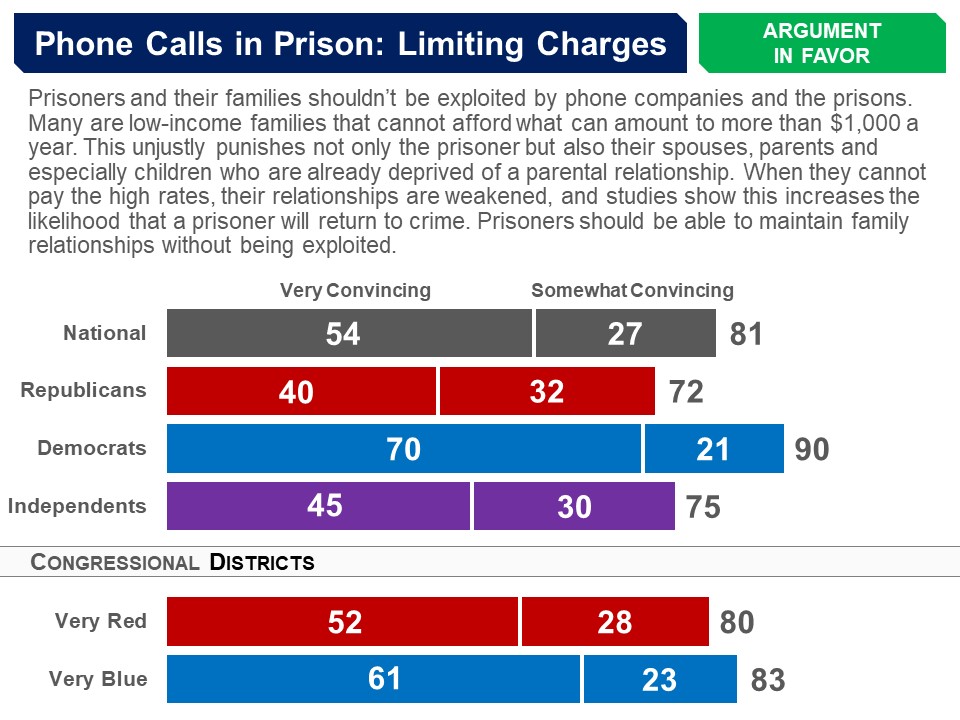
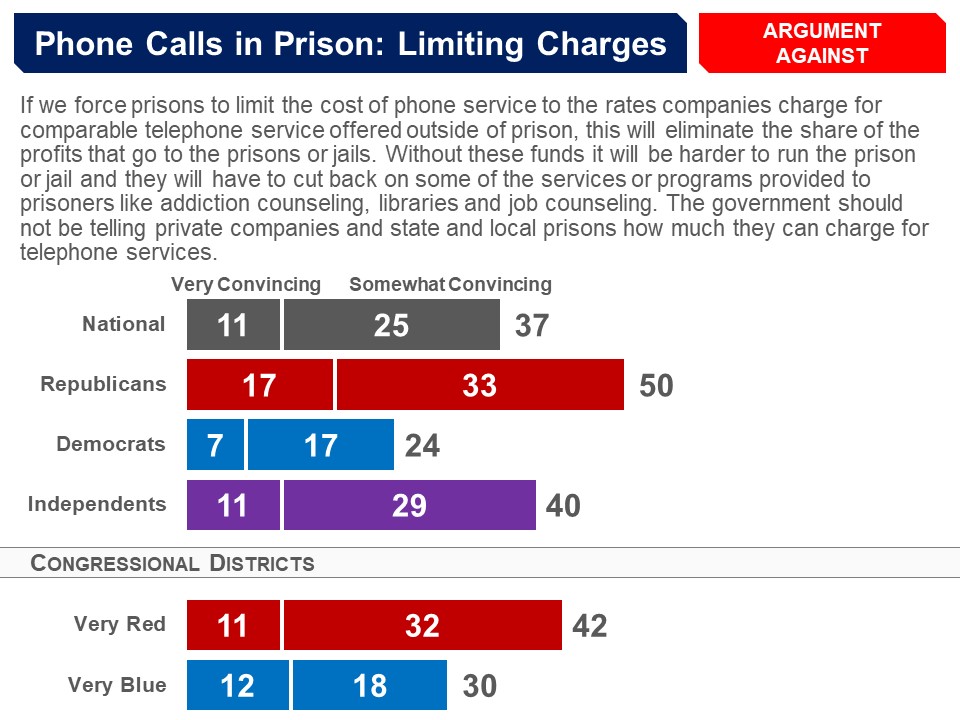 Asked for their final recommendation, a large bipartisan majority of 77% were in favor, including two thirds of Republicans and 88% of Democrats.
Asked for their final recommendation, a large bipartisan majority of 77% were in favor, including two thirds of Republicans and 88% of Democrats.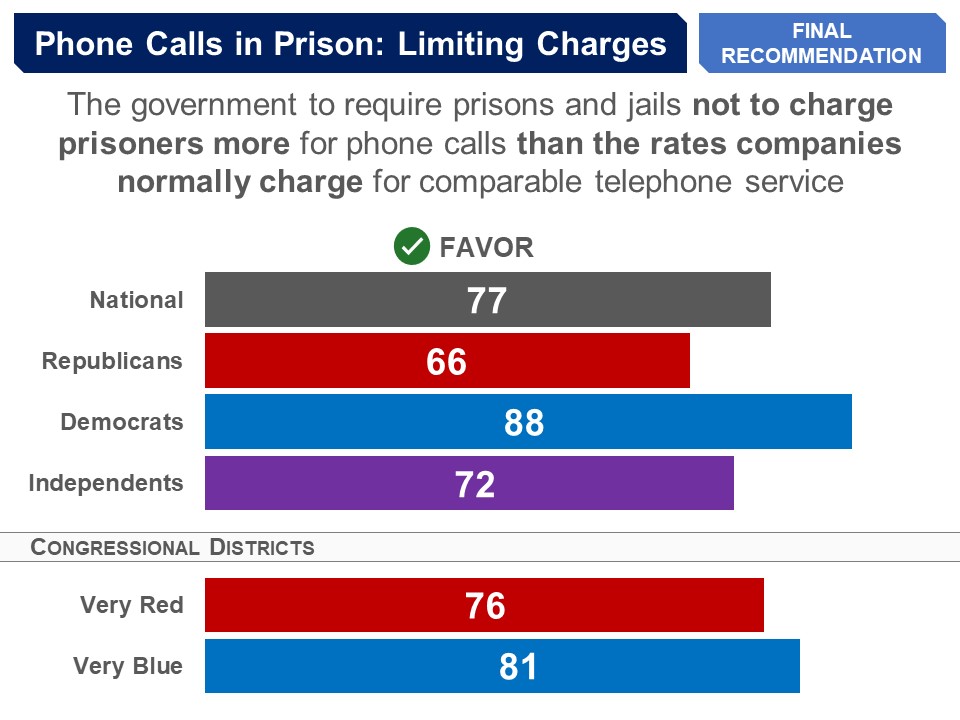
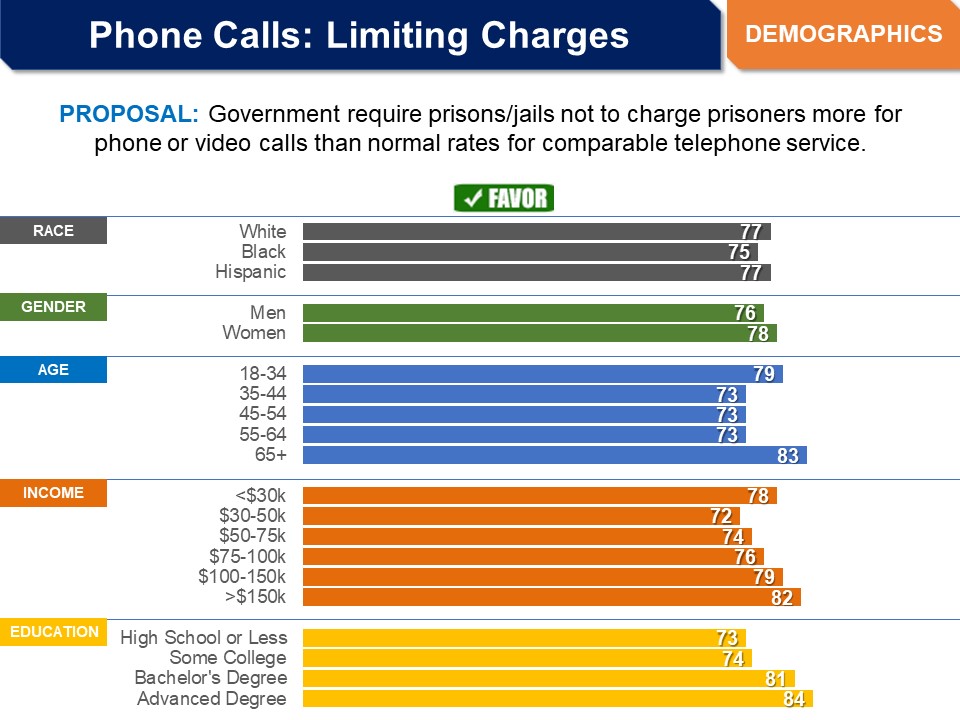 Status of Legislation
Status of Legislation


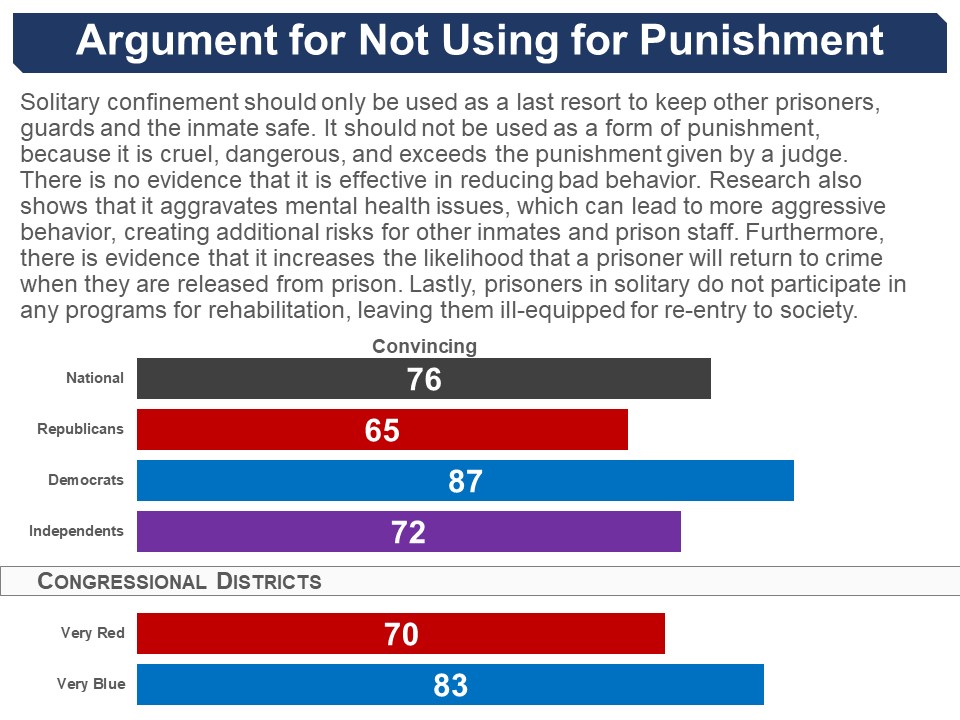
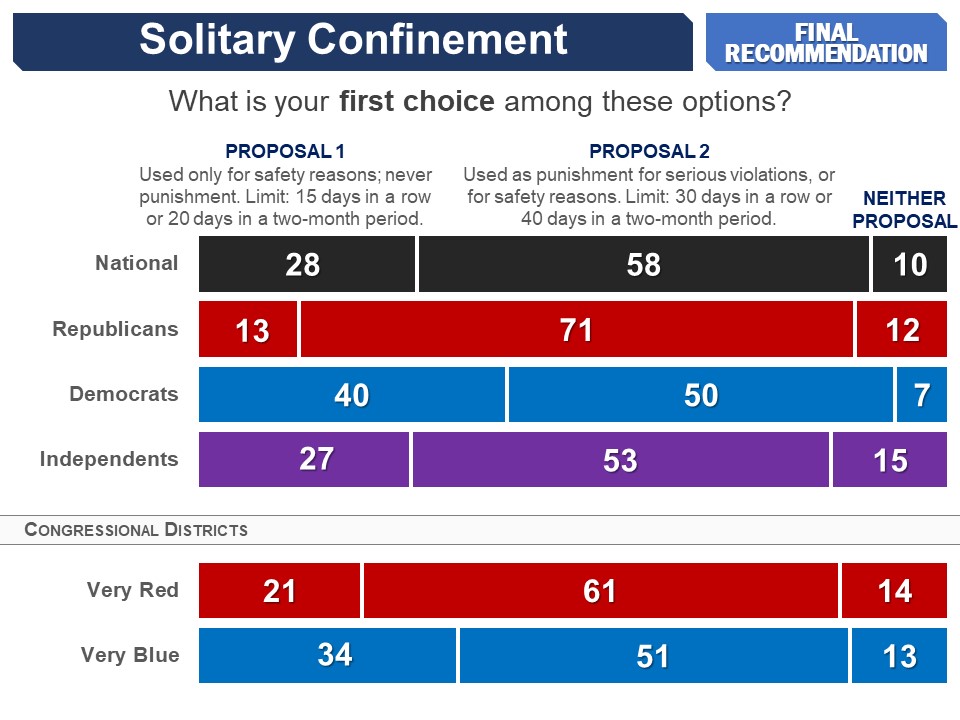
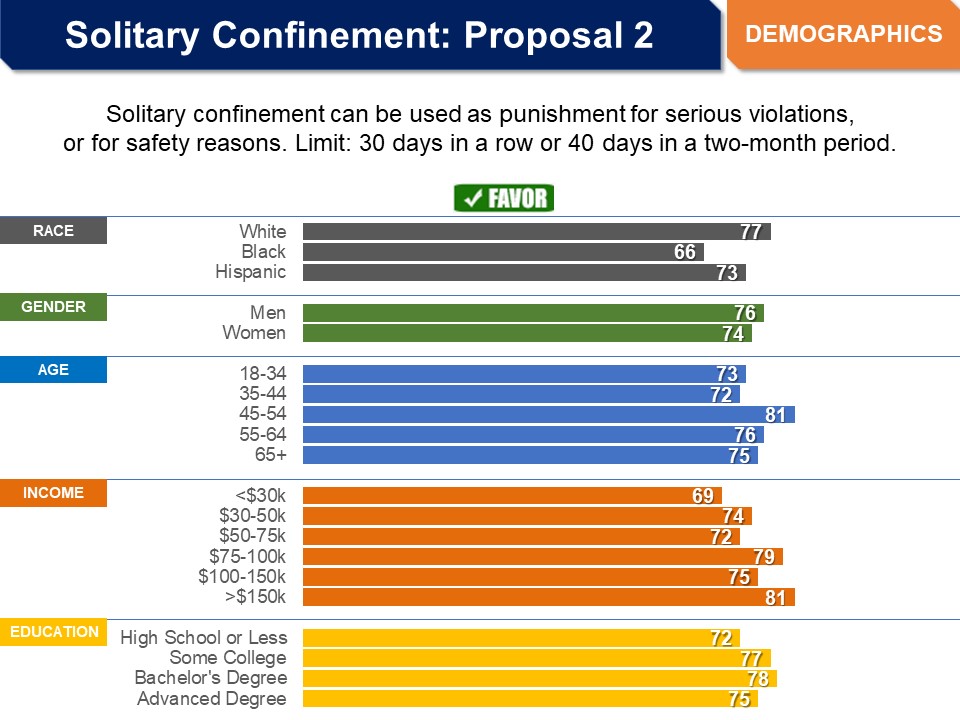



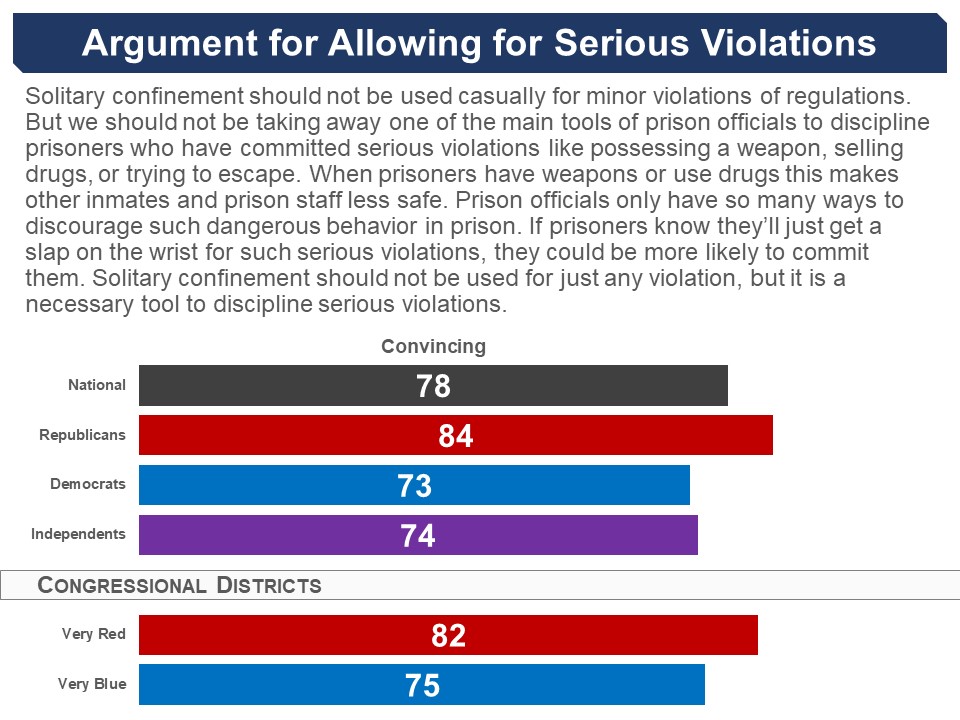 The argument in favor of, “making no changes to the way solitary confinement is used,” was found convincing by a modest and partisan majority of 55%, including seven in ten Republicans, but less than four in ten Democrats.
The argument in favor of, “making no changes to the way solitary confinement is used,” was found convincing by a modest and partisan majority of 55%, including seven in ten Republicans, but less than four in ten Democrats.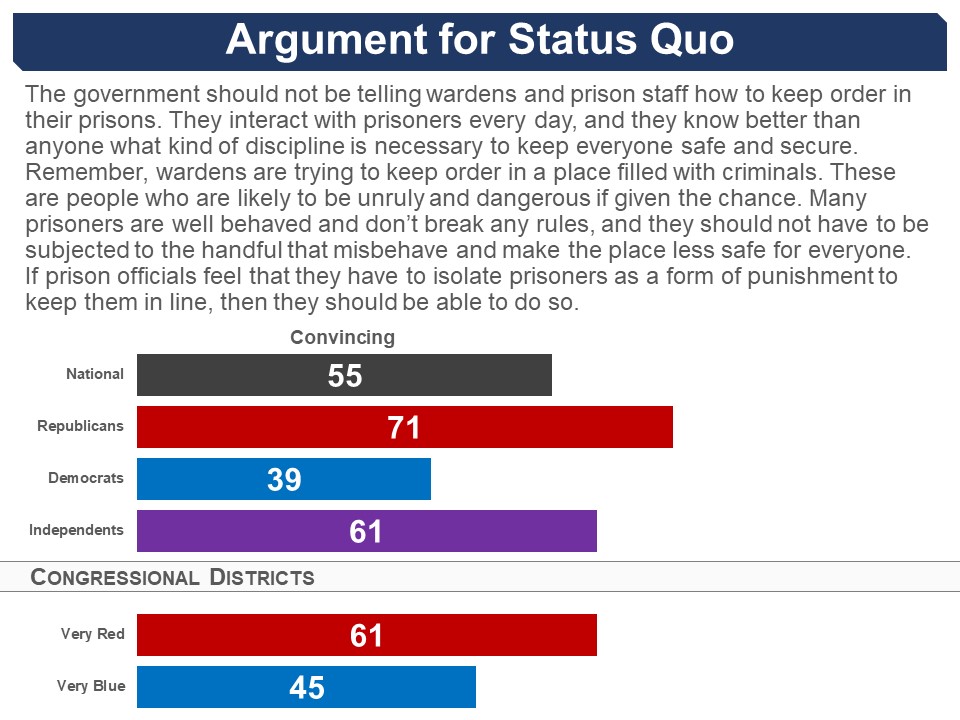 Final Recommendations
Final Recommendations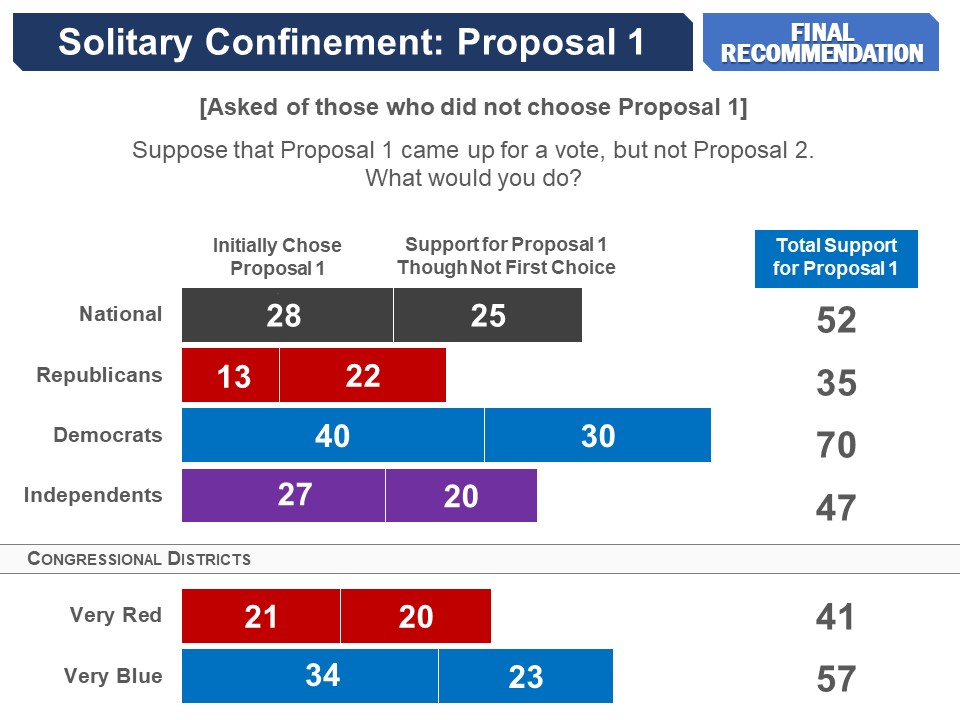
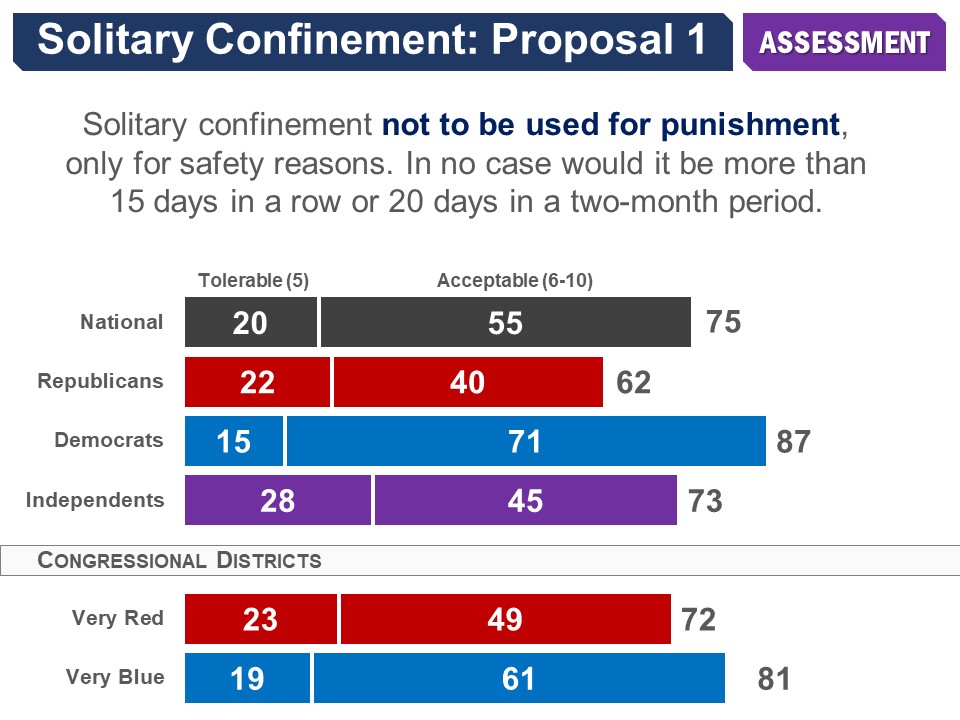 Asked the same question about the more restrictive Proposal 2, 10% said they would not vote for it, although they supported the less restrictive Proposal 1. In total, 75% supported or would vote for it, including 79% of Republicans and 75% of Democrats.
Asked the same question about the more restrictive Proposal 2, 10% said they would not vote for it, although they supported the less restrictive Proposal 1. In total, 75% supported or would vote for it, including 79% of Republicans and 75% of Democrats.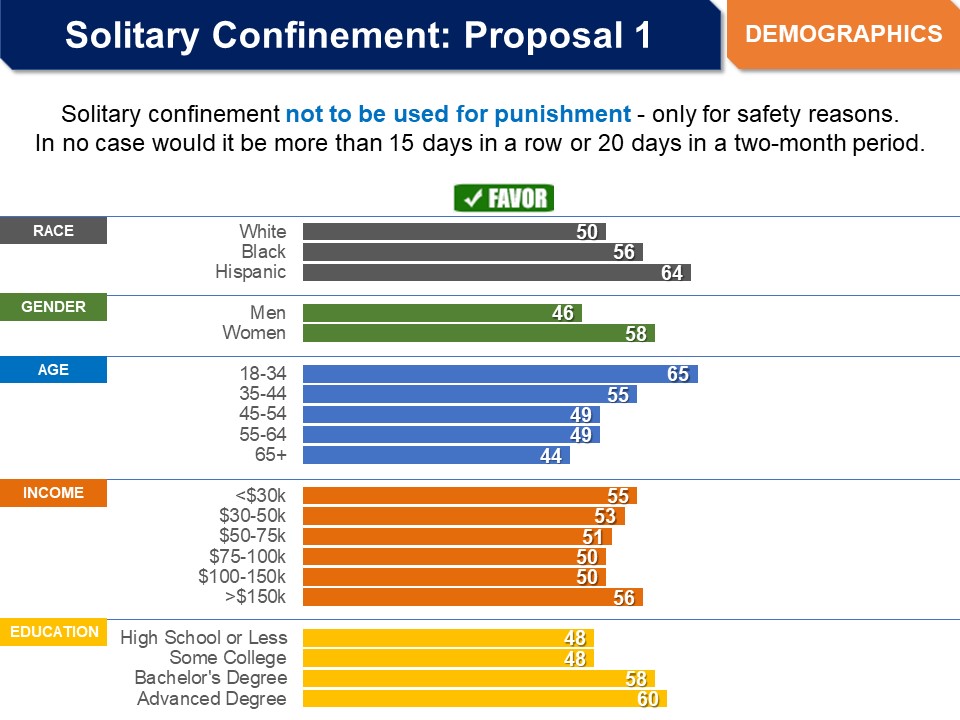 Status of Legislation
Status of Legislation